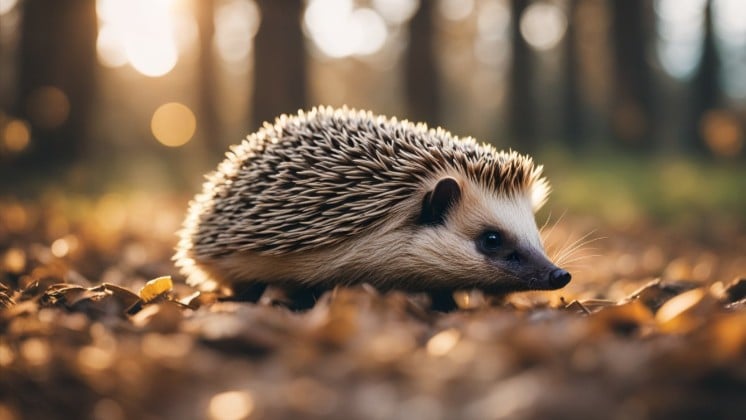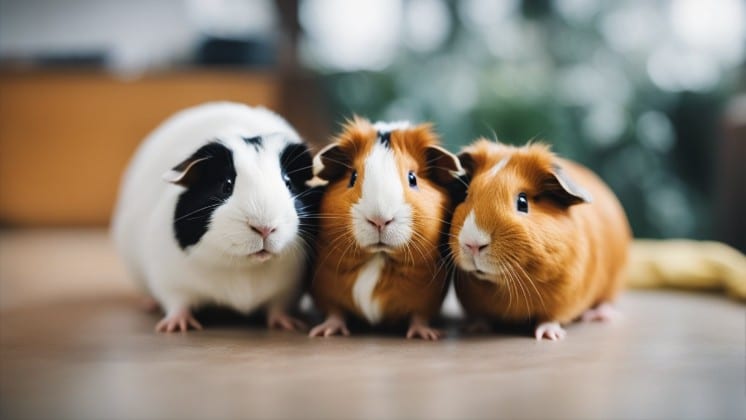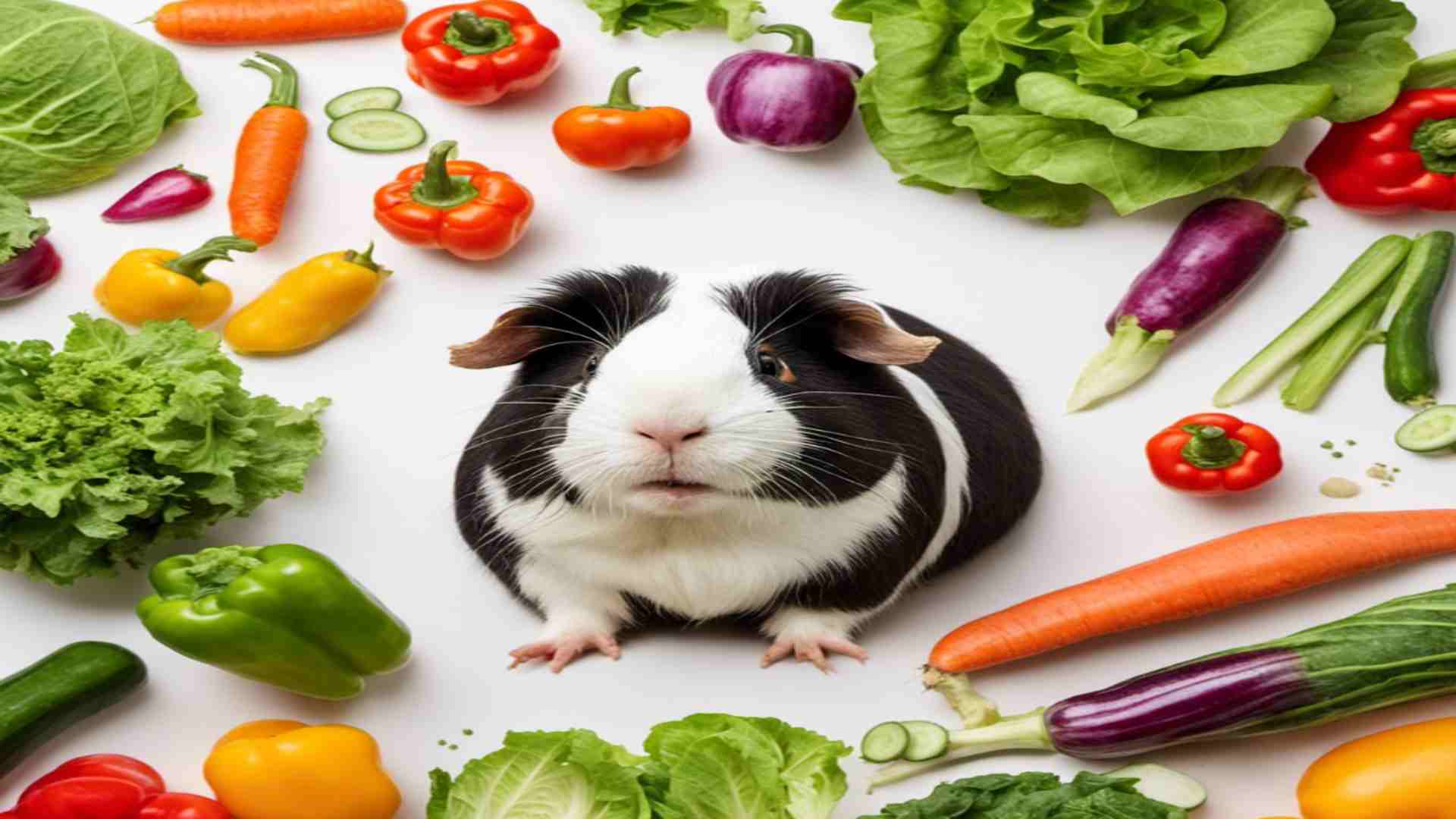Hedgehogs are one of the most adorable creatures on earth. With their tiny little bodies and prickly spines, they can easily capture our hearts.
However, you must be aware of many things when caring for hedgehogs as pets. One such thing is their poop color. Yes, you read that right! Hedgehog’s poop color can tell much about their health and well-being.
This article will discuss everything you need to know about hedgehogs’ poop color. So, buckle up, and let’s get started!
Hedgehog poop chart
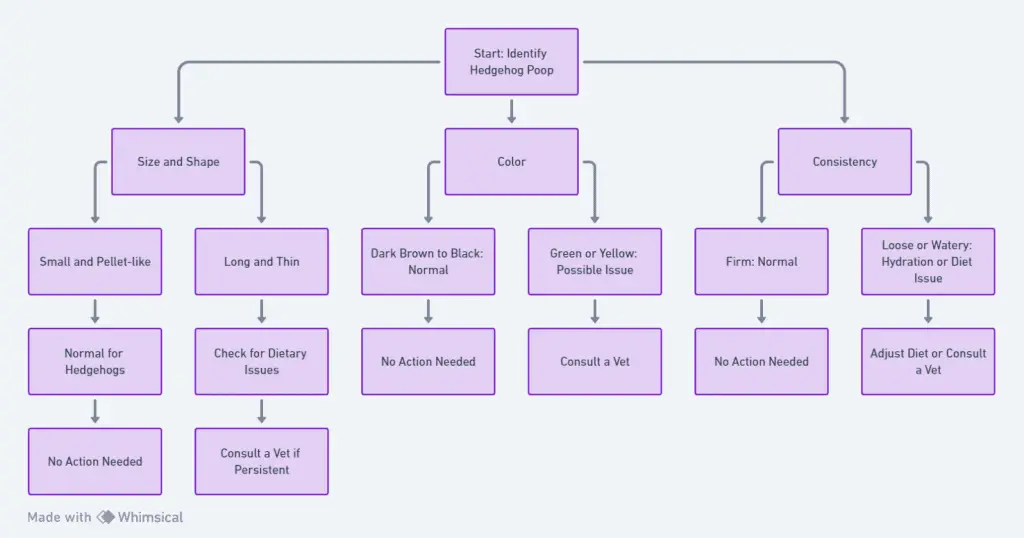
What does hedgehog poop look like?
Hedgehogs are fascinating creatures with unique characteristics, including their distinct pooping habits. Many people may wonder, “what does hedgehog poo look like?” Hedgehog feces are typically dark brown or black in color, cylindrical in shape, and are similar in size to a small grape.
The texture is firm and dry, often containing undigested insect exoskeletons. It’s essential to pay attention to the color and consistency of a hedgehog’s poop, as changes can indicate potential health issues. Regular monitoring of their feces can help ensure their well-being and provide valuable insights into their diet and overall health
Do hedgehogs poop a lot?
Yes, hedgehogs do poop a lot. They have a high metabolism and need to eat frequently, resulting in frequent bowel movements. Hedgehog poop is typically dark brown or black in color and can vary in texture depending on their diet. It’s important to monitor their poop for any signs of health issues.
What is the reason for the variety of colors in hedgehog feces?
The color of hedgehog feces can tell you a lot about their health and diet. Normally, hedgehog feces are dark brown or black because of the presence of bile pigments. However, it’s common to see various colors in their poop.
Dehydration can also affect the color of hedgehog feces. When a hedgehog doesn’t drink enough water, their urine becomes more concentrated and darker, which may change the color of its poop.
Let’s look at some common colors of hedgehog poop and what they could indicate.
Chart of hedgehog poop colors
Before we delve deeper into the different colors of hedgehog poop, it’s essential to understand what is normal for your pet. Monitor their bathroom habits and note any changes in frequency or texture.
Red or reddish-brown
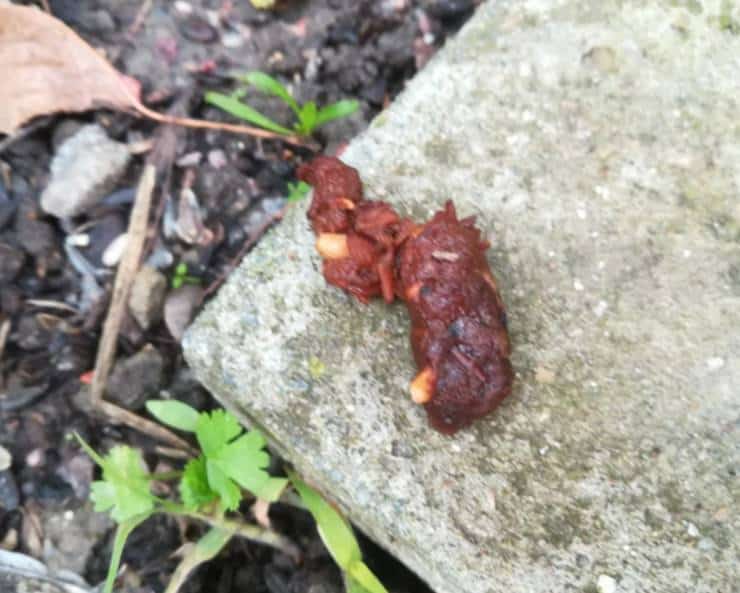
This type of poop color in hedgehogs may be a cause for concern. It could indicate blood in the stool, which could be due to various reasons like intestinal parasites and infections. If you notice this type of poop color consistently in your pet, consult a veterinarian immediately.
That said, it is also worth mentioning that if your hedgehog has been consuming red-colored foods like berries or beets, it could also affect the color of its poop.
Greenish poop
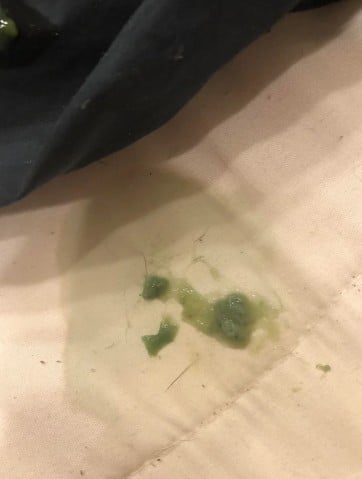
source: Reddit user u/
Greenish poop, also known as ‘stress poop,’ is a type of stool that hedgehogs produce when they are anxious or stressed. This can be caused by various factors, such as environmental changes and handling.
It can also result from a diet high in fruits and vegetables, which can cause an imbalance in the hedgehog’s digestive system.
That said, If it’s just a day or two, there is no need to worry. However, if green poop persists or is accompanied by other symptoms like lethargy or poor appetite, it’s best to consult a veterinarian.
Wet black poop
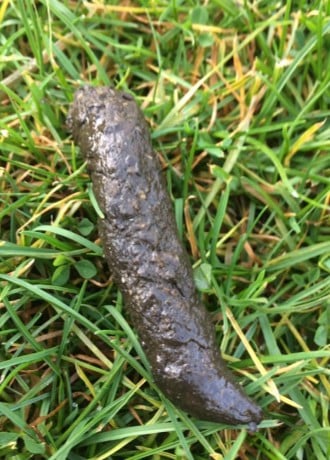
Black hedgehog feces are considered normal and healthy. This is because the presence of bile pigments in their stool gives it a dark color that ranges from brownish.
If your pet’s poop is consistently green, it may be time to consult a veterinarian.
Weak/jelly poop
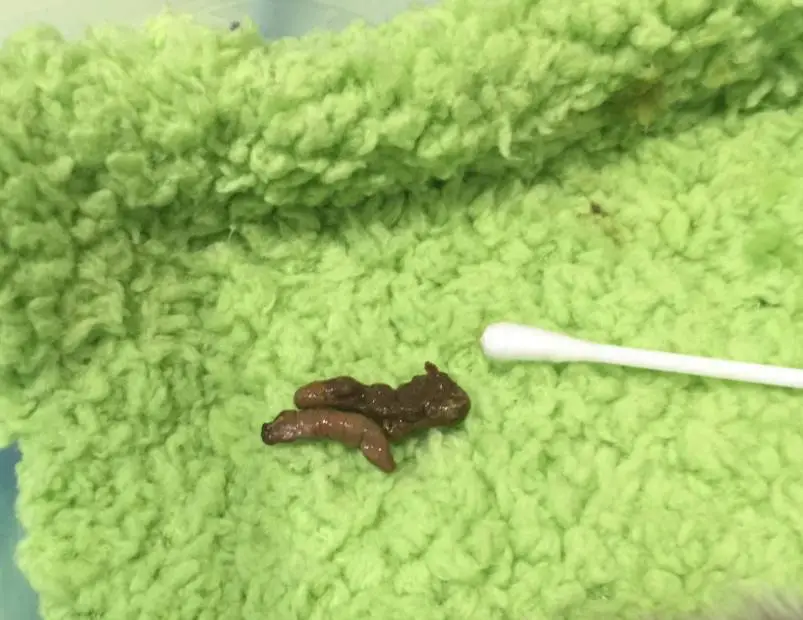
Dry poop
Dry poop in hedgehogs is usually a sign of dehydration. When a hedgehog doesn’t drink enough water or wet food, their feces become dry and brittle. It may also indicate an underlying health issue, such as an intestinal blockage or constipation.
If your hedgehog’s poop appears to be dry and crumbly, make sure they have access to fresh water at all times, but also ensure that they are getting enough moisture in their diet.
White or pale poop
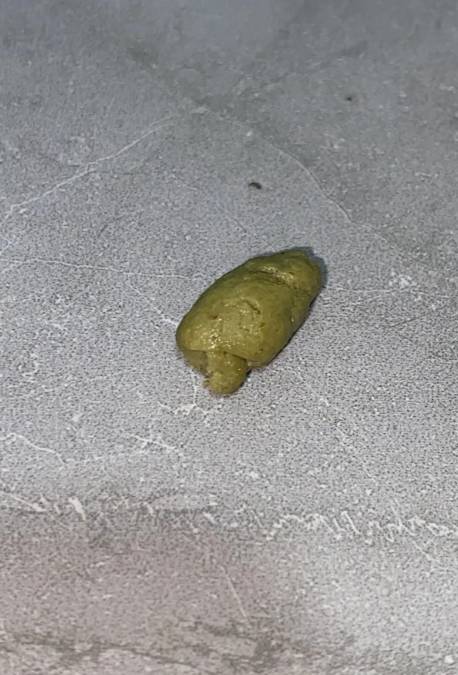
Pale or whitish poop in hedgehogs can indicate a problem with their diet or digestion. Hedgehogs are insectivores and require a diet high in protein to maintain their health.
That said, It may be a sign of liver or pancreatic problems, which can affect the digestion and absorption of fats in their diet.
This results in the excretion of undigested fat, giving their poop a white or pale yellow appearance.
Balls shaped poop
Often, it is common for hedgehogs to have small, round droppings resembling balls. This is due to the fact that hedgehogs have a digestive system that is designed to process food efficiently and eliminate waste.
Hedgehogs are insectivorous animals, meaning they primarily eat insects and other small invertebrates. Their digestive system is adapted to quickly break down these foods into smaller particles.
The result of this rapid digestion is often small, firm droppings that can easily be mistaken for balls or pellets. These droppings are usually tan or brown in color and may have a slight odor.
Watery poop
Watery poop in hedgehogs is a cause for concern and should be addressed immediately. It may indicate an underlying health issue, such as diarrhea, which can lead to dehydration and other complications.
Diarrhea can be caused by various factors, including changes in diet, stress, infections, or parasites. If your hedgehog’s poop appears watery or loose, monitor their behavior closely and contact a veterinarian as soon as possible.
That said, these issues occur for a reason. Something has disrupted the natural balance of your hedgehog’s digestive system, and it’s important to identify the cause and address it promptly to avoid further complications.
What does affect the color of hedgehog poop?
There are different reasons why your hedgehog’s poop may change color, including:
Food
Food plays a crucial role in the color and consistency of hedgehog poop. A balanced diet should include the following:
- Vegetables
- Insects
- Fruits
Water is also part of their diet and essential for maintaining proper hydration. Ensure to replace the water daily even if they haven’t finished it.
Stress
Stress can also affect the color and consistency of hedgehog poop. When a hedgehog is stressed, its body may produce more feces than usual, leading to softer or looser stool that could appear greenish.
- Environmental conditions. Stressful conditions such as loud noises, overcrowding, or frequent handling can cause stress in hedgehogs, which can cause stress and changes in their poop color and consistency.
- Change in routine. Any change in the hedgehog’s routine, such as a new enclosure, new diet, or new home, can cause stress and lead to changes in poop color.
- New pet. Introducing a new pet can lead to stressful situations since hedgehogs are prey animals. They may perceive the new animal as a threat, leading to changes in their poop color and consistency.
How can I alleviate the stress in my hedgehog?
As a hedgehog owner, one of the most important tasks is to make your pet feel comfortable and safe in their environment. A stressed pet is unhappy and more prone to health issues.
Let’s look at some ways to make your pet feel more relaxed:
1. Provide a comfortable living environment
Hedgehogs need a cozy and safe space to thrive. Make sure their cage is big enough so they can move around with ease and has plenty of hiding places.
2. Maintain a consistent temperature
Hedgehogs are sensitive to sudden fluctuations in temperature. Keep their enclosure at a consistent temperature between 73-78 degrees Fahrenheit.
3. Offer appropriate food
A healthy diet is essential for keeping your hedgehog happy and relaxed. Feed them a well-balanced diet consisting of high-protein cat food, vegetables, and fruits. Avoid feeding them foods that contain preservatives, sugar, or salt, as these can cause health problems and contribute to stress.
4. Allow sufficient exercise
Hedgehogs like to move around, climb and explore their surroundings just like other pets! Placing toys in the enclosure would help keep your pet entertained, thereby reducing boredom and stress.
5. Handle your hedgehog with care
When handling your hedgehog, make sure you use gentle hands since they have quills that protect them against predators but may be painful when mishandled or grabbed roughly by humans.
Why is knowing the color of hedgehog poop important?
Knowing the color of your hedgehog’s poop can help you identify potential health problems early on.
If you notice a sudden change in their poop color, it may be an indication of an underlying issue that requires prompt attention.
Keeping track of their feces color will give you a better understanding of your pet’s digestive system and whether their diet is balanced and healthy.
What to do if you notice a change in your hedgehog’s poop color?
If you notice a change in your hedgehog’s poop color, it could be an indication of a health issue. It is important to monitor their feces regularly and take note if there are any unusual changes.
The first step is to identify the cause of the change. Changes in diet or stress levels can often lead to changes in poop consistency and color.
If the change persists over a few days, it is best to take your hedgehog to a veterinarian specializing in exotic animals.
They can perform tests and determine if any underlying health issues need attention.
Generally, healthy hedgehog poop should be firm, moist, and dark brown. Any significant deviation from this could indicate a problem.
Summary
Before we move on to the conclusion, we’ve summarized this article into a short list of key points for you to remember:
- Hedgehogs are sensitive to changes in their routine and environment, which can lead to changes in poop color.
- To alleviate stress in your hedgehog, provide a comfortable living environment, maintain a consistent temperature, offer appropriate food, allow sufficient exercise, and handle them carefully.
- Keep track of their poop color to identify potential health issues early on.
- Healthy hedgehog poop should be firm, moist, and dark brown. Any significant deviation from this could indicate a problem.
- If you notice a change in your hedgehog’s poop color, monitor it for a few days and try to identify the cause. If the change persists or is concerning, take your pet to a veterinarian specializing in exotic animals for examination and treatment.
Conclusion
There you have it!
Everything you need to know about hedgehog poop color. Remember that food, stress, environmental factors, and changes in routine can all affect the color and consistency of hedgehog poop.
Want to learn more about chinchillas?
Ready to boost your knowledge to the next level? If so, check out the articles below:
- Do Hedgehogs Eat Mice? (Explained)
- Do Dogs Attack Hedgehogs? (If so, What to Do)
- Hedgehogs Cuddles: What You Don’t Know (Yet)



